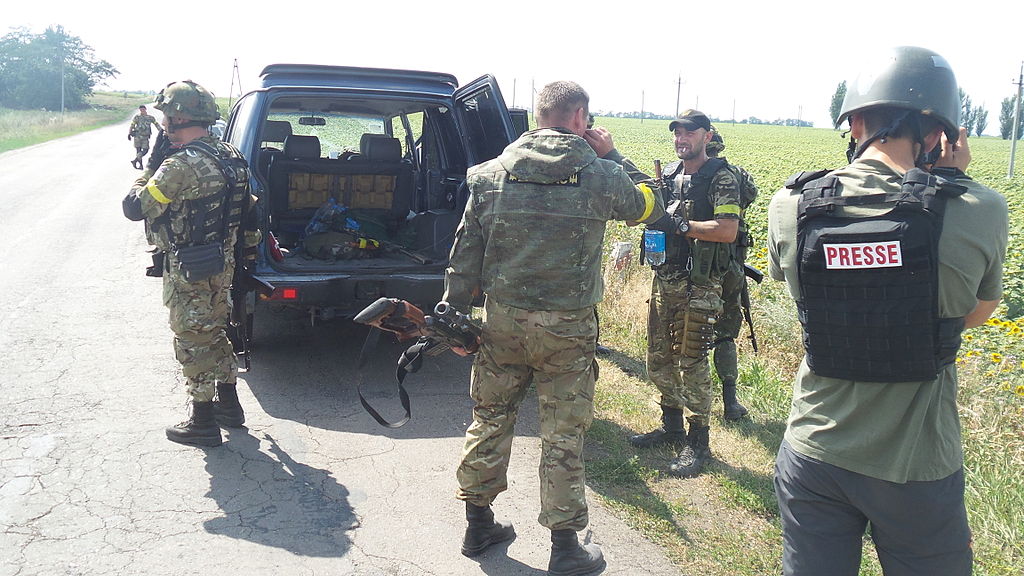
Battallion “Donbas” in the Donetsk region
Most Western commentators are claiming yesterday’s White House summit as a good result for the European powers. The bar must have been low. The optics suggested something different as European leaders sat deferentially in a semi-circle around Trump whom they showered with sycophantic praise. At least, I assume their thinking goes, Zelensky wasn’t completely humiliated.
In so far as there were any, the concrete outcomes appear even less favourable for the Europeans than the photo-ops. There were three things on the European’s wish list. First getting some guarantees from the US for a post-ceasefire security operation. This desire in itself exposes the Europeans’ underlying military weakness. As one military analyst put in ruefully in the Financial Times over the weekend, “there is simply no appetite amongst European countries to risk war with Russia beyond rhetoric. If Moscow decides to test the coalition of the willing, it could quickly transform into a coalition of the unwilling”.
This was underlined by the reticence of German Chancellor Merz and most others to say anything concrete about the involvement of their armies. Instead, they hung on Trump’s every word. You could see the satisfaction on their faces when Trump made some noises suggesting that the US was prepared to be involved in Ukraine post-ceasefire.
Documents putting the Ukrainians’ proposals forward before the meeting suggest the reality behind this is that Ukraine will promise to buy $100bn of American weapons financed by Europe in a bid to obtain US guarantees for its security after a peace settlement with Russia.
The second focus was to block the idea touted by US envoy Steve Witkoff that Ukraine should cede some territory not yet under Russian military control in Donetsk and Luhansk. Here there seems to have been no discernible progress from the European’s point of view. The issue was barely mentioned in public. Once again, even the aim betrays weakness. Zelensky is balking at any territorial concessions, but the Europeans appear to have accepted that, at least for the time being, some if not all Russian military advances will be rewarded in peace negotiations.
The third aim was to block any negotiations before a ceasefire. For all the insistence of Macron and Merz, they seem to have made no headway. Trump accepted the idea that talks could take place without a ceasefire at last week’s Alaska meeting with Putin, and there were no signs of any change of heart in Washington.
So, what are the prospects for peace? In Alaska, The Russians asked for guarantees of neutrality from Ukraine, and demanded Ukraine withdraw completely from the Donbas (Donetsk and Luhansk) and accept de facto control of conquered territory in Zaporizhzhia and Kherson. They also wanted a reset of relations with the US including an end to NATO expansion and a relaunch of the Intermediate-Range Nuclear Forces Treaty which Trump withdraw from in 2019.
These would be heavy prices for Ukraine to pay and there is no great pressure on Putin to rush to a deal, as Russia is making ground militarily. Trump clearly wants a deal for his own reputation but more importantly to shift Russia away from Chinese influence and to help him refocus military efforts towards the East.
Judging by their performance in Washington, the main European powers are hardly going to insist on Zelensky’s red lines, but the danger remains that the terrible war could drag on for months or even years.
The Ukrainian people are the prime victims of a terrible great power conflict that could have been avoided. Going right back to the end of the cold war in 1991, the US alienated the Russians and broke the promise made to Mikhail Gorbachev that NATO wouldn’t expand Eastwards. Putin warned the West then that any discussion of Ukraine or Georgia joining NATO would cross a red line, but in 2007 precisely those discussions began.
The US-aided removal of the Yanukovych government in 2014 led to Russian military intervention. Combined, these events destabilised the country and threatened to break it in two. A peace process – the Minsk accords – was largely ignored by the Western powers. In April 2022, months after the Russian invasion, another peace process was famously scuppered when Boris Johhnson rushed to Kiev to pass on the news that the West would not be party to any negotiations.
Serious talks at any of these times had the potential to avoid the deaths of hundreds of thousands and might have concluded on terms much more favourable to the Ukrainians.
For the European powers and their ‘coalition of the willing’ the key thing appears to be that whatever concessions are made to Russia, Ukraine becomes a bulwark against Putin, armed to the teeth, as much as possible by the US. This is no long-term solution to the crisis in the region. We in the anti-war movement have to do our best to stop Starmer and a rapidly rearming Europe turning Ukraine and the rest of eastern Europe into a fortress.